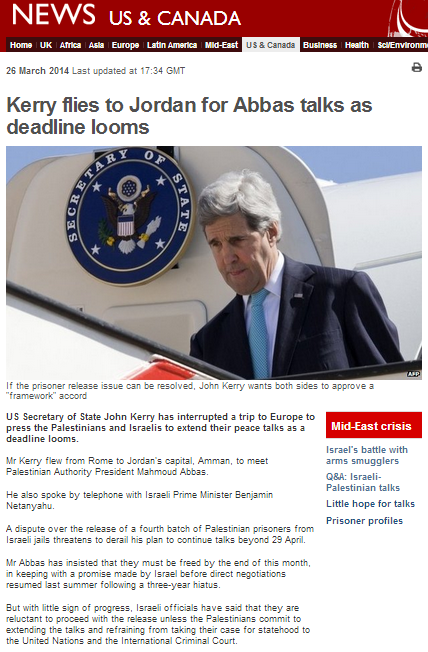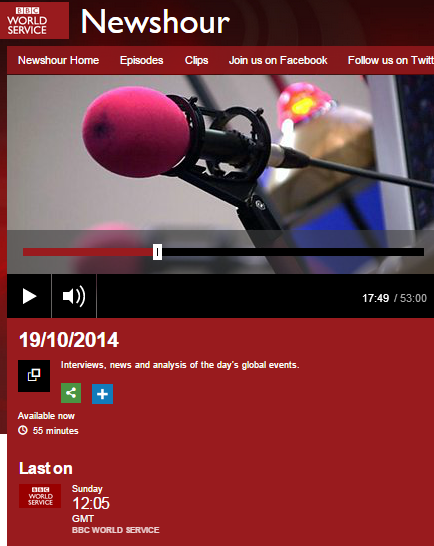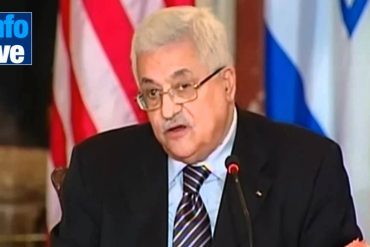On March 26th an article titled “Kerry flies to Jordan for Abbas talks as deadline looms” appeared on the Middle East and US & Canada pages of the BBC News website. 
The article states:
“A dispute over the release of a fourth batch of Palestinian prisoners from Israeli jails threatens to derail his [Kerry’s] plan to continue talks beyond 29 April.
Mr Abbas has insisted that they must be freed by the end of this month, in keeping with a promise made by Israel before direct negotiations resumed last summer following a three-year hiatus.”
The BBC fails to inform readers that the prisoner releases were from the very beginning tied to the talks’ progress – of which there has been little to date – as explained by the Israeli prime minister to his electorate last July.
“I believe that it is important for the State of Israel to enter a diplomatic process that will continue for at least nine months – in order to check if it is possible to reach an agreement with the Palestinians during this time.
But even with all of the importance that I ascribe to the diplomatic process, I was not prepared to accept the Palestinians’ demands for withdrawals and freezes as preconditions for entering negotiations.
Neither was I prepared to accept their demand to release Palestinian prisoners before the start of negotiations. I did agree to release 104 Palestinians in stages after the start of the negotiations and in accordance with the circumstances of their progress.” [emphasis added]
The report goes on to say:
“The Palestinians have also said the 26 prisoners should include 14 Arab-Israelis, but the Israelis have insisted they made no such commitment.”
The BBC fails to inform audiences that the subject of which prisoners are to be released and when is decided by a committee of Israeli ministers – not by the Palestinian Authority.
“The vote on the release of 104 Palestinian prisoners as a goodwill gesture ahead of renewed peace talks was delayed for several hours on Sunday morning as Netanyahu sought to secure enough support for the move, in the face of internal pressure from within his own Likud party.
In an attempt to neutralize the strong opposition within his party, Netanyahu made a distinction between Israeli Arab prisoners and other prisoners, saying a decision to release the former would be made separately and brought to an additional vote. […]
The prime minister also said that a committee to be made up of himself, Defense Minister Moshe Ya’alon, Justice Minister Tzipi Livni, Public Security Minister Yitzhak Aharonovitch, and Science and Technology Minister Yaakov Peri, a former Shin Bet head, will be established to determine which prisoners will released, and when.”
Of course no attempt is made by the BBC to point out to audiences the absurdity of the discordant assumption by the Palestinian Authority that it can demand the release of murderers who are citizens of the state in which they are imprisoned due to their having killed citizens of the same state.
Neither does this article bother to inform readers with regard to the likelihood of the PA’s agreeing to extend the talks after April 29th: a point which is particularly relevant given that the PLO’s chief negotiator made it very clear during an interview with the BBC just last month that the chances of that are exceedingly slim.
The report ends:
“Arab League leaders attending a summit in Kuwait on Tuesday expressed their “total rejection” of Israel’s call to be recognised as a Jewish state.
The Palestinians recognise the State of Israel, but say recognising its Jewish character would have implications for refugees and Israeli-Arabs.”
Once again, no attempt whatsoever is made to inform BBC audiences of the significance of Israel’s demand that the PA recognize Israel as the Jewish state as far as ending any future claims – and therefore the conflict – is concerned.
There is of course a distinct possibility that this round of talks will become unsustainable in the coming days or weeks. Whether the BBC will choose to ‘contextualise’ that through promotion of the notion that Israel did not meet its agreements regarding prisoner releases or whether it will be the demand for recognition of Israel as the Jewish state or some other Israeli action which will be blamed for the collapse is as yet unclear.
What is obvious, however, is that the scene is already being set by means of articles such as this one which fail to provide audiences with accurate and comprehensive information and instead simply opt to amplify the narrative of the Palestinian Authority and its Arab League mentor.
Related Articles:
BBC audiences are not being updated on ME talks
Accuracy and impartiality issues in BBC report on Abbas White House visit
Why has the BBC stopped reporting on the Israel-PLO peace talks?




